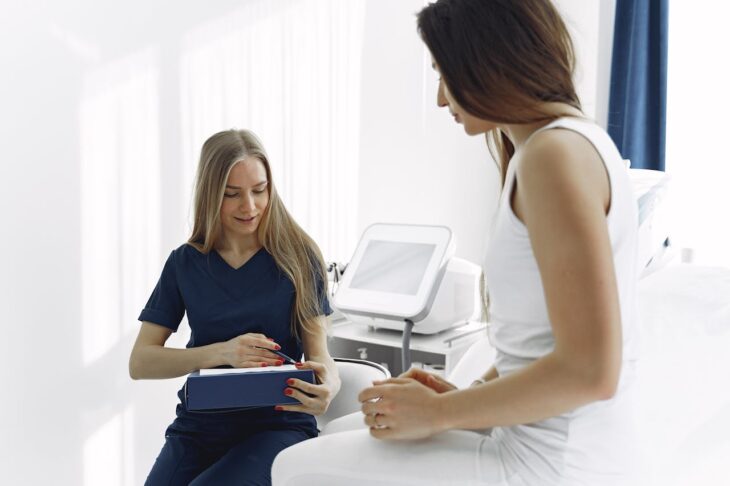
When you’re trying to conceive and it just isn’t happening you may question your fertility. And as you consider the future fate of your ability to conceive you may wonder if it’s time you and your partner seek professional fertility guidance. According to the American College of Obstetricians and Gynecologists, experts recommend an infertility evaluation if, after one year (six months for females over 35) of unprotected sexual intercourse, you haven’t conceived.
Do You Need Fertility Evaluation?
Both you and your partner should seek fertility guidance because the source of your inability to conceive may relate to one or both of you. During an infertility evaluation your doctor takes a medical history and does a full physical examination.
Based on any issues the doctor uncovers you’ll then go through some testing. These tests include blood tests, semen evaluation, ultrasound and other imaging tests and, if necessary, some medical procedures. Females typically see their OB-GYN then a reproductive endocrinologist (fertility specialist) and males see a urologist for the evaluation.
5 Signs It’s Time to Seek Professional Fertility Guidance
Many couples are unaware of any fertility issues they may have until they try to conceive. Other couples and individuals experience symptoms of infertility or may already be aware of an underlying condition. Here are five signs that it’s time to seek professional fertility guidance.
- Irregular or Absent Periods
An irregular menstrual cycle or the absence of menstruation altogether could indicate problems with ovulation. According to the NIH ovulatory disorders account for 25% of known infertility causes. Doctors identify irregular periods as those lasting less than 21 days between cycles or more than 35 days between your periods.
Although irregular periods may happen now and again if you experience consistently irregular periods, abnormal bleeding or bleeding between your periods or no periods at all (and you aren’t pregnant.) seek professional fertility guidance.
- Endometriosis
Endometriosis is a disease that impacts the reproductive organs. A type of tissue nearly identical to the tissue that lines your uterus attaches to other organs such as your ovaries, fallopian tubes, the outer part of your uterus and even your intestines, bowel and rectum. There the tissue grows and causes inflammation which leads to infertility.
Endometriosis causes painful periods, pain during intercourse, changes in urination and bowel movements, and heavy menstrual bleeding. For some females there are no indications until they try to conceive. However, if you have any of the above-mentioned symptoms please schedule an evaluation with your doctor.
- Uterine Fibroids
Uterine fibroids are benign growths in the uterus and a common condition. They may not cause any problems, however they sometimes cause blockages that prevent the egg from implanting.
Uterine fibroids present with these symptoms:
- Heavy menstrual bleeding
- Periods that last longer than a week
- Passing of clots during your period
- Constipation
- Pelvic pain
- A feeling of pressure in your pelvic region
- Frequent urination
Uterine fibroids may cause fertility issues as well as interfere with pregnancy. Doctors link fibroids to placental abruption, preterm labor, impaired fetal growth and miscarriage. If your doctor diagnoses uterine fibroids, they are easily removed through a procedure that keeps your uterus intact.
- Sexually Transmitted Disease
Females diagnosed with the STDs chlamydia and gonorrhea risk pelvic inflammatory disease (PID) a cause of infertility. Left untreated STDs damage the reproductive system in both males and females. That’s why it is crucial that both partners regularly screen for STDs.
- Age
Age definitely impacts your fertility. For those females over 35, who’ve tried to conceive for 6 months without success it’s time to seek fertility guidance from your physician. And for men over 40, keep in mind age also impacts your ability to conceive. You also may need to seek a fertility evaluation.
When you are in your 20s, you likely have healthy eggs, blanched hormones and ovulate regularly. A female in her 20s has a 25% likelihood of pregnancy occurring after three months of regular intercourse. After the age of 30 the chance for pregnancy drops to 20% and by age 40 the odds are at a mere 7%. That’s because your eggs diminish in viability and your ovarian reserve also diminishes as you age.
Age also impacts male fertility. As you get older, your testosterone levels dip and may cause loss of muscle mass, weight gain and low sperm count as well as poor sperm health. Those couples for whom age might be an issue should absolutely plan for a fertility evaluation.
The Professional Fertility Guidance You Need
If you’re concerned about your fertility or you suspect any of the above conditions interferes with your ability to conceive, please contact LA IVF. You need our professional, knowledgeable and compassionate team on your side as you navigate your path to parenthood.


